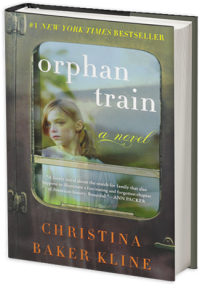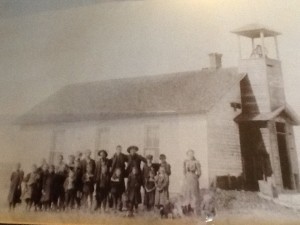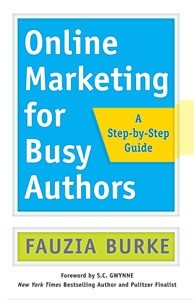Beverly Scott's Blog, page 13
April 11, 2016
Book Review: Orphan Train by Christina Baker Kline
Reviewed by Bev Scott
Two young girls both long for family and acceptance. Yet their young experiences are separated by almost eighty years. Vivian, a young abandoned Irish immigrant is sent on the train to the uncertainty of the rural mid-west in hopes of finding a loving home. Much later in her life, while living on the Maine coast in a quiet peaceful existence, Molly comes to help Vivian sort through her possessions and keepsakes. Molly is seventeen and living in foster homes. An outsider as a Penobscot Indian, she reluctantly agrees to help Vivian in order to stay out of juvenile hall. Molly discovers that she and Vivian have more in common than she imagined.
The story is told by the author moving back and forth between present-day Maine and the depression years in Minnesota. The engaging story describes a seldom acknowledged treatment in U.S. history of abandoned and orphaned children.
Orphan Train by Christina Baker Kline
Reviewed by Bev Scott
Two young girls both long for family and acceptance. Yet their young experiences are separated by almost eighty years. Vivian, a young abandoned Irish immigrant is sent on the train to the uncertainty of the rural mid-west in hopes of finding a loving home. Much later in her life, while living on the Maine coast in a quiet peaceful existence, Molly comes to help Vivian sort through her possessions and keepsakes. Molly is seventeen and living in foster homes. An outsider as a Penobscot Indian, she reluctantly agrees to help Vivian in order to stay out of juvenile hall. Molly discovers that she and Vivian have more in common than she imagined.
The story is told by the author moving back and forth between present-day Maine and the depression years in Minnesota. The engaging story describes a seldom acknowledged treatment in U.S. history of abandoned and orphaned children.
April 5, 2016
Do You Have the Courage to Write Fiction? by Bev Scott
 Reading Elizabeth Gilbert’s latest book, Big Magic, caused me to reflect on my internal journey to be willing to write the fictionalized story of my grandparents.
Reading Elizabeth Gilbert’s latest book, Big Magic, caused me to reflect on my internal journey to be willing to write the fictionalized story of my grandparents.
“Do you have the courage? Do you have the courage to bring forth this work? The treasures that are hidden inside you are hoping you will say yes.”
Quoted by Elizabeth Gilbert in Big Magic: Creative Living Beyond Fear.
Have you pretended that you weren’t afraid or used excuses to avoid being brave? It took many years for me to find the courage to begin even the research required to write the story about my grandparents. I would share some details and the family rumors about their lives with others, which would encourage me to write about it. But I brushed the idea away. I told myself that I had a career and other goals to pursue. But as I read this quote in Gilbert’s book, I realized that I didn’t have the courage to take the risk of writing about this story. I was afraid to put it out in public. It was safer to work with clients or to write about my consulting experience both of which denoted years, even decades of successful practice in the field of organization development.
Finally, I was ready to slow down my consulting practice and create the time to conduct the research to uncover all the details about my grandfather’s life. So I set out as I have written in other blogs to confirm the whispered family secrets and to learn about his life before he met my grandmother. Gilbert mentions that it is common among women to want to be one hundred percent prepared for taking on a new project or position. I was no different. I sought to have all the details and be thoroughly knowledgeable about the dates of birth, marriage, death, Civil War service, explanations about moves to far away states and many more details. I figured when I had all this information; I could write about my grandparents’ lives as an expert. Having all “your ducks in a row” does not require courage or bravery. The facts and detailed information provide a clear cover.
Missing Information
Alas! I could not find all the information to explain why my grandfather left a wife pregnant with their sixth child, why he is missing from all the public records for almost fourteen years or why he moved from Nebraska to Oklahoma and then to New Mexico. I now wanted to share the story, but there was so much missing information from the account that I wasn’t sure what would complete the tale.
I could write the story as fiction based on the true story as I knew it. Write fiction! I had never done that; I had only written non-fiction–professional papers and books. I would need to learn how to be creative. I didn’t think of myself as creative. Gilbert argues that if we are alive, we are creative. It was scary for me to think about writing fiction when I knew nothing about this genre. But Gilbert suggests that courage and bravery mean doing something scary. Did I have the courage to bring this story forth in fiction?
Courage to Write Fiction
I began going to workshops, reading, signing up for blogs and going to a writer’s conference and meeting with other authors. I joined a writers group. I learned about the publishing industry and writing fiction. I was excited about everything I learned. As I networked and met new colleagues, I needed a new identity. Gilbert declares that defining yourself as a creative person begins by identifying yourself. I started to say “I am a writer.” As I called myself a writer, I found the courage to bring forth the fictionalized story of my grandparents which I hope to publish this year.
Have you avoided bringing forth your work? How did you overcome your fear? Have you thought of yourself as creative? Courageous?
“Do You Have the Courage to Write Fiction?” by Bev Scott
 Reading Elizabeth Gilbert’s latest book, Big Magic, caused me to reflect on my internal journey to be willing to write the fictionalized story of my grandparents.
Reading Elizabeth Gilbert’s latest book, Big Magic, caused me to reflect on my internal journey to be willing to write the fictionalized story of my grandparents.
“Do you have the courage? Do you have the courage to bring forth this work? The treasures that are hidden inside you are hoping you will say yes.”
Quoted by Elizabeth Gilbert in Big Magic: Creative Living Beyond Fear.
Have you pretended that you weren’t afraid or used excuses to avoid being brave? It took many years for me to find the courage to begin even the research required to write the story about my grandparents. I would share some details and the family rumors about their lives with others, which would encourage me to write about it. But I brushed the idea away. I told myself that I had a career and other goals to pursue. But as I read this quote in Gilbert’s book, I realized that I didn’t have the courage to take the risk of writing about this story. I was afraid to put it out in public. It was safer to work with clients or to write about my consulting experience both of which denoted years, even decades of successful practice in the field of organization development.
Finally, I was ready to slow down my consulting practice and create the time to conduct the research to uncover all the details about my grandfather’s life. So I set out as I have written in other blogs to confirm the whispered family secrets and to learn about his life before he met my grandmother. Gilbert mentions that it is common among women to want to be one hundred percent prepared for taking on a new project or position. I was no different. I sought to have all the details and be thoroughly knowledgeable about the dates of birth, marriage, death, Civil War service, explanations about moves to far away states and many more details. I figured when I had all this information; I could write about my grandparents’ lives as an expert. Having all “your ducks in a row” does not require courage or bravery. The facts and detailed information provide a clear cover.
Missing Information
Alas! I could not find all the information to explain why my grandfather left a wife pregnant with their sixth child, why he is missing from all the public records for almost fourteen years or why he moved from Nebraska to Oklahoma and then to New Mexico. I now wanted to share the story, but there was so much missing information from the account that I wasn’t sure what would complete the tale.
I could write the story as fiction based on the true story as I knew it. Write fiction! I had never done that; I had only written non-fiction–professional papers and books. I would need to learn how to be creative. I didn’t think of myself as creative. Gilbert argues that if we are alive, we are creative. It was scary for me to think about writing fiction when I knew nothing about this genre. But Gilbert suggests that courage and bravery mean doing something scary. Did I have the courage to bring this story forth in fiction?
Courage to Write Fiction
I began going to workshops, reading, signing up for blogs and going to a writer’s conference and meeting with other authors. I joined a writers group. I learned about the publishing industry and writing fiction. I was excited about everything I learned. As I networked and met new colleagues, I needed a new identity. Gilbert declares that defining yourself as a creative person begins by identifying yourself. I started to say “I am a writer.” As I called myself a writer, I found the courage to bring forth the fictionalized story of my grandparents which I hope to publish this year.
Have you avoided bringing forth your work? How did you overcome your fear? Have you thought of yourself as creative? Courageous?
March 22, 2016
Finding Family Secrets by Bev Scott
March 12 was Genealogy Day begun by Christ Church in Ireland in Ireland in 2013. In celebration of the day, I offer a brief story of the sources I used in my own roots journey. Not all genealogy sources are on-line. Going on location, seeing actual gravesites and including others in your search such as museum and library staff or members of historical societies, can also lead to special assistance, new leads and the encouragement from those who love history and genealogy. I hope that this story might inspire you to begin a search or look at alternative sources to help you put the pieces of your family puzzle together.
In the early years of my adult life balancing my roles as mother, spouse and professional, I didn’t have time to think about my ancestors or my family heritage. I was too busy coping with carpool, making dinner or meeting the demands of my boss. However, as I attended family gatherings and funerals when my parents or their siblings died, I began to hear interesting family myths and stories that intrigued me. Others around me began pursuing their own family roots. One of my aunts encouraged me to find information about her father, my grandfather, Harvey Depew Scott. And my genealogical journey began.
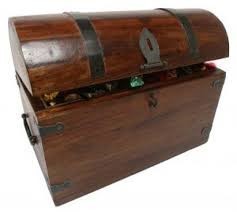 It began at the National Archives in Washington, DC where I found thick files of correspondence, government forms and personal letters about my grandfather. The National Archives is a treasure trove of fascinating information about veterans who have served in our armed forces as well as immigrants who arrived at the US borders from countries around the world seeking a better life. It is an excellent place to begin your own genealogy search. I knew the surprising fact that my grandfather fought in the Civil War and my aunt had given me the data about his enlistment in the Union Army under a different name, John Howard Scott. This enabled me to request the files and to be able to read through each valuable piece of information.
It began at the National Archives in Washington, DC where I found thick files of correspondence, government forms and personal letters about my grandfather. The National Archives is a treasure trove of fascinating information about veterans who have served in our armed forces as well as immigrants who arrived at the US borders from countries around the world seeking a better life. It is an excellent place to begin your own genealogy search. I knew the surprising fact that my grandfather fought in the Civil War and my aunt had given me the data about his enlistment in the Union Army under a different name, John Howard Scott. This enabled me to request the files and to be able to read through each valuable piece of information.
What I learned from those files, confirmed the whispered family secrets about John Howard Scott who changed his name to Harvey Depew Scott. I learned where and when he was born, lived and died. I now had enough information to search for more information about him and his ancestry. Over the next several years, I traveled to many states in search of answers to my questions about his family of origin. In Indiana where he was born, I visited the county courthouse and the local public library. I learned about his father’s death when he was four and that his mother died in a poor house. I found remote rural cemeteries where his uncle was buried; in the library, I discovered his uncle was a riverboat captain on the Mississippi River. But I found nothing about how or when John Howard’s parents came to Indiana, nor could I find any information about his grandparents.
Now I was hooked. Doing the research in family history is like putting together a jigsaw puzzle. As I found one piece of data, it would suggest other connections and often raise more questions. I was on the search to find more pieces to fit into the puzzle. I combed through the US Census Data, traveled to other states where John Howard and later Harvey Depew lived. I visited historical museums and requested help from local historical societies. I even made copies of the whole file at the National Archives so I could review every detail.
fit into the puzzle. I combed through the US Census Data, traveled to other states where John Howard and later Harvey Depew lived. I visited historical museums and requested help from local historical societies. I even made copies of the whole file at the National Archives so I could review every detail.
I joined Ancestry.com to see if anyone else might be researching the same family, hoping to find new information. There were some other potential connections to John Howard Scott’s family but without documentation. I have learned to beware of the validity of postings of family relationships based on family stories but without documentation. So alas, I was not able to find documentation, confirmation or information to answer my questions.
My genealogical journey has been fascinating. I wrote a detailed series of blogs about what I found called “Journey to Fiction”. As that title suggests, I decided that I could best write the story as fiction, with the opportunity to be creative with the missing information. I hope to publish the book, “Trust, Betrayal and Forgiveness: A Family Story” later this year. Have you searched for family history in your family? What have you found? What has been your experience doing genealogy?
“Finding Family Secrets” by Bev Scott
March 12 was Genealogy Day begun by Christ Church in Ireland in Ireland in 2013. In celebration of the day, I offer a brief story of the sources I used in my own roots journey. Not all genealogy sources are on-line. Going on location, seeing actual gravesites and including others in your search such as museum and library staff or members of historical societies, can also lead to special assistance, new leads and the encouragement from those who love history and genealogy. I hope that this story might inspire you to begin a search or look at alternative sources to help you put the pieces of your family puzzle together.
In the early years of my adult life balancing my roles as mother, spouse and professional, I didn’t have time to think about my ancestors or my family heritage. I was too busy coping with carpool, making dinner or meeting the demands of my boss. However, as I attended family gatherings and funerals when my parents or their siblings died, I began to hear interesting family myths and stories that intrigued me. Others around me began pursuing their own family roots. One of my aunts encouraged me to find information about her father, my grandfather, Harvey Depew Scott. And my genealogical journey began.
 It began at the National Archives in Washington, DC where I found thick files of correspondence, government forms and personal letters about my grandfather. The National Archives is a treasure trove of fascinating information about veterans who have served in our armed forces as well as immigrants who arrived at the US borders from countries around the world seeking a better life. It is an excellent place to begin your own genealogy search. I knew the surprising fact that my grandfather fought in the Civil War and my aunt had given me the data about his enlistment in the Union Army under a different name, John Howard Scott. This enabled me to request the files and to be able to read through each valuable piece of information.
It began at the National Archives in Washington, DC where I found thick files of correspondence, government forms and personal letters about my grandfather. The National Archives is a treasure trove of fascinating information about veterans who have served in our armed forces as well as immigrants who arrived at the US borders from countries around the world seeking a better life. It is an excellent place to begin your own genealogy search. I knew the surprising fact that my grandfather fought in the Civil War and my aunt had given me the data about his enlistment in the Union Army under a different name, John Howard Scott. This enabled me to request the files and to be able to read through each valuable piece of information.
What I learned from those files, confirmed the whispered family secrets about John Howard Scott who changed his name to Harvey Depew Scott. I learned where and when he was born, lived and died. I now had enough information to search for more information about him and his ancestry. Over the next several years, I traveled to many states in search of answers to my questions about his family of origin. In Indiana where he was born, I visited the county courthouse and the local public library. I learned about his father’s death when he was four and that his mother died in a poor house. I found remote rural cemeteries where his uncle was buried; in the library, I discovered his uncle was a riverboat captain on the Mississippi River. But I found nothing about how or when John Howard’s parents came to Indiana, nor could I find any information about his grandparents.
Now I was hooked. Doing the research in family history is like putting together a jigsaw puzzle. As I found one piece of data, it would suggest other connections and often raise more questions. I was on the search to find more pieces to fit into the puzzle. I combed through the US Census Data, traveled to other states where John Howard and later Harvey Depew lived. I visited historical museums and requested help from local historical societies. I even made copies of the whole file at the National Archives so I could review every detail.
fit into the puzzle. I combed through the US Census Data, traveled to other states where John Howard and later Harvey Depew lived. I visited historical museums and requested help from local historical societies. I even made copies of the whole file at the National Archives so I could review every detail.
I joined Ancestry.com to see if anyone else might be researching the same family, hoping to find new information. There were some other potential connections to John Howard Scott’s family but without documentation. I have learned to beware of the validity of postings of family relationships based on family stories but without documentation. So alas, I was not able to find documentation, confirmation or information to answer my questions.
My genealogical journey has been fascinating. I wrote a detailed series of blogs about what I found called “Journey to Fiction”. As that title suggests, I decided that I could best write the story as fiction, with the opportunity to be creative with the missing information. I hope to publish the book, “Trust, Betrayal and Forgiveness: A Family Story” later this year. Have you searched for family history in your family? What have you found? What has been your experience doing genealogy?
March 8, 2016
Who Are Your Family Role Models and Inspiration? by Bev Scott
Years ago, one of my favorite aunts came for a visit when I was in my mid-thirties experiencing a low point in my life. She gave a life-long gift by reminding me of the role models I had in the strong women in my family. It was from them, I could always find inspiration and direction.
Both of my grandmothers had been school teachers. My paternal grandmother, Ellen, also became a school superintendent. Ellen was a great cheerleader and encouraged me to succeed in school, get good grades and go to college. My maternal grandmother, Grace, was disappointed that she had to give up teaching school to become a farmer’s wife. But she continued to read the Atlantic Monthly and other books and periodicals. She wrote letters about what she read and shared her opinions about the news and politics in letters to her daughters.
My aunt pointed out that both Ellen and Grace had significant challenges in their lives: Grace, reluctantly left school teaching which she loved to manage her husband’s family farm which she resented. She worked hard to survive the depression and the dust bowl. Ellen was left a widow when her youngest of five children was a few months old.
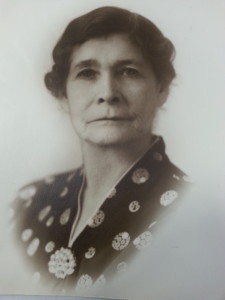 Ellen, in particular has been an inspiration to me. I am currently writing a fictionalized story of her life. As a widow without a means of support, Ellen applied for widows benefits. The Government Agent who came in April of 1912 to interview her in person, filed a sensitive descriptive report, (which I recovered from the National Archives). She was living in a tent south of Thedford, Nebraska where she had filed a land claim. He reports that
Ellen, in particular has been an inspiration to me. I am currently writing a fictionalized story of her life. As a widow without a means of support, Ellen applied for widows benefits. The Government Agent who came in April of 1912 to interview her in person, filed a sensitive descriptive report, (which I recovered from the National Archives). She was living in a tent south of Thedford, Nebraska where she had filed a land claim. He reports that
“she hopes to establish a home for herself and children; but it looks like a most hazardous undertaking as she is practically an invalid because of rheumatism (sic), and her children are undersized puny looking little fellows, and they are more than a mile from the nearest water….In their present desolate surroundings their condition is pitiable in the extreme.”
This was the occasion when she learned that her husband had a former wife and family. The agent describes,
“until I informed her of the fact, claimant declares she had no knowledge of the existence of a former wife. Her grief and tears where convincing of the truth. She begged me not to tell anyone in her home neighborhood.”
This helps explain why no one in the family knew about a prior family. Ellen shared no information about him with her children. Despite her crippling rheumatoid arthritis, she pulled herself together; returned to teaching school; became a school superintendent; and raised her family. See my blog series, “A Journey to Fiction” on my genealogical journey to learn about my paternal grandparents.
Both Grace and Ellen were also models of strength, resilience and accomplishment for their daughters. All five of my aunts completed college educations at a time when the lack of financial resources and societies’ cultural norms were major deterrents. Yet, they were persistent and resourceful. They found work to pay their way. Between the first wave of feminism and the second, during my young adulthood, all these women had successful careers and raised a family. They worked hard and overcame many obstacles. To me they were pillars of strength and fortitude. They were role models of how meet challenges and find a satisfying life.
These seven women have been my inspiration and my role models. I honor and pay tribute to them on International Women’s Day.
Who are the women role models in your family? How have they influenced and inspired you? Are there other strong women who have served as role models and inspired you?
“Who Are Your Family Role Models and Inspiration?” by Bev Scott
Years ago, one of my favorite aunts came for a visit when I was in my mid-thirties experiencing a low point in my life. She gave a life-long gift by reminding me of the role models I had in the strong women in my family. It was from them, I could always find inspiration and direction.
Both of my grandmothers had been school teachers. My paternal grandmother, Ellen, also became a school superintendent. Ellen was a great cheerleader and encouraged me to succeed in school, get good grades and go to college. My maternal grandmother, Grace, was disappointed that she had to give up teaching school to become a farmer’s wife. But she continued to read the Atlantic Monthly and other books and periodicals. She wrote letters about what she read and shared her opinions about the news and politics in letters to her daughters.
My aunt pointed out that both Ellen and Grace had significant challenges in their lives: Grace, reluctantly left school teaching which she loved to manage her husband’s family farm which she resented. She worked hard to survive the depression and the dust bowl. Ellen was left a widow when her youngest of five children was a few months old.
 Ellen, in particular has been an inspiration to me. I am currently writing a fictionalized story of her life. As a widow without a means of support, Ellen applied for widows benefits. The Government Agent who came in April of 1912 to interview her in person, filed a sensitive descriptive report, (which I recovered from the National Archives). She was living in a tent south of Thedford, Nebraska where she had filed a land claim. He reports that
Ellen, in particular has been an inspiration to me. I am currently writing a fictionalized story of her life. As a widow without a means of support, Ellen applied for widows benefits. The Government Agent who came in April of 1912 to interview her in person, filed a sensitive descriptive report, (which I recovered from the National Archives). She was living in a tent south of Thedford, Nebraska where she had filed a land claim. He reports that
“she hopes to establish a home for herself and children; but it looks like a most hazardous undertaking as she is practically an invalid because of rheumatism (sic), and her children are undersized puny looking little fellows, and they are more than a mile from the nearest water….In their present desolate surroundings their condition is pitiable in the extreme.”
This was the occasion when she learned that her husband had a former wife and family. The agent describes,
“until I informed her of the fact, claimant declares she had no knowledge of the existence of a former wife. Her grief and tears where convincing of the truth. She begged me not to tell anyone in her home neighborhood.”
This helps explain why no one in the family knew about a prior family. Ellen shared no information about him with her children. Despite her crippling rheumatoid arthritis, she pulled herself together; returned to teaching school; became a school superintendent; and raised her family. See my blog series, “A Journey to Fiction” on my genealogical journey to learn about my paternal grandparents.
Both Grace and Ellen were also models of strength, resilience and accomplishment for their daughters. All five of my aunts completed college educations at a time when the lack of financial resources and societies’ cultural norms were major deterrents. Yet, they were persistent and resourceful. They found work to pay their way. Between the first wave of feminism and the second, during my young adulthood, all these women had successful careers and raised a family. They worked hard and overcame many obstacles. To me they were pillars of strength and fortitude. They were role models of how meet challenges and find a satisfying life.
These seven women have been my inspiration and my role models. I honor and pay tribute to them on International Women’s Day.
Who are the women role models in your family? How have they influenced and inspired you? Are there other strong women who have served as role models and inspired you?
March 7, 2016
Book Review: Online Marketing for Busy Authors by Fauzia Burke
This small book is packed with tips, advice, suggestions and literal steps to plan and implement a marketing plan for authors who know little or even hate marketing. Fauzia Burke takes your hand and guides you step by step. She begins with your dreams, helps you establish your priorities, tells you how to implement and closes with the importance of on-going sales monitoring of your published book. She gives helpful tips and advice to implement an online marketing plan including a website, mailing list, blog and social media. Her recommendations hold for first-time self-published authors as well as the experienced or traditionally published.
Ms. Burke has devoted her career to marketing authors and supports her advice by including stories of her coaching and support for authors. She writes with a clear direct style that encourages me to sit down and follow her advice step by step.
I recommend this book for all of us who are authors resisting and reluctant to market ourselves and our books. Burke provides an easy to guide to help us overcome our foot-dragging. I am motivated get started creating the marketing plan for my book.
Author Website: http://www.fauziaburke.com/online-marketing-for-busy-authors/
Reviewed by: Bev Scott, March 7, 2016
Online Marketing for Busy Authors by Fauzia Burke
This small book is packed with tips, advice, suggestions and literal steps to plan and implement a marketing plan for authors who know little or even hate marketing. Fauzia Burke takes your hand and guides you step by step. She begins with your dreams, helps you establish your priorities, tells you how to implement and closes with the importance of on-going sales monitoring of your published book. She gives helpful tips and advice to implement an online marketing plan including a website, mailing list, blog and social media. Her recommendations hold for first-time self-published authors as well as the experienced or traditionally published.
Ms. Burke has devoted her career to marketing authors and supports her advice by including stories of her coaching and support for authors. She writes with a clear direct style that encourages me to sit down and follow her advice step by step.
I recommend this book for all of us who are authors resisting and reluctant to market ourselves and our books. Burke provides an easy to guide to help us overcome our foot-dragging. I am motivated get started creating the marketing plan for my book.
Author Website: http://www.fauziaburke.com/online-marketing-for-busy-authors/
Reviewed by: Bev Scott, March 7, 2016

